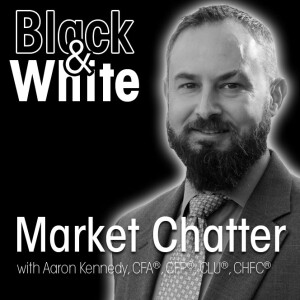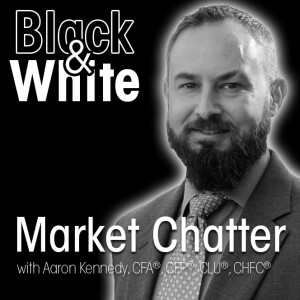The Life Planning 101 Podcast
Episodes

3 days ago
3 days ago
In this episode, Kade Sparger is joined by Aaron Kennedy and Sam Barker to discuss the market's recent all-time highs and the factors driving it. They touch on the impact of tariffs, tax policies, and the potential of AI and deregulation on economic growth. Aaron emphasizes the importance of long-term planning and not getting caught up in daily market fluctuations.

Thursday Jul 03, 2025
This Week in the Market - Episode 81 (7/2/25)
Thursday Jul 03, 2025
Thursday Jul 03, 2025
In this episode of Life Planning 101's Black and White Market Minute, Kade Sparger is joined by Aaron Kennedy and Sam Barker to discuss the current state of the market and potential future trends. They analyze recent market performance, the impact of economic news, and the psychological factors influencing investor behavior. The speakers also delve into the implications of the recent "big, beautiful bill" and offer advice on personal finance strategies, including Roth conversions and disciplined spending.

Tuesday Jul 01, 2025
This Week in the Market - Episode 80 (6/27/25)
Tuesday Jul 01, 2025
Tuesday Jul 01, 2025
In this episode, Aaron Kennedy and Sam Barker discuss portfolio management, specifically focusing on individual stock portfolios and the quality growth portfolio. They explore the decision-making processes involved in managing these portfolios, the impact of timing on returns, and the importance of diversification. The conversation also delves into the potential risks and opportunities presented by autonomous vehicles and their impact on the automotive and insurance industries.

Tuesday Jun 24, 2025
This Week in the Market - Episode 79 (6/20/25)
Tuesday Jun 24, 2025
Tuesday Jun 24, 2025
In this episode, Aaron, Sam, and Kade discuss the impact of politics and tariffs on the market, the psychology of investing, and strategies for long-term financial success. They emphasize the importance of ignoring short-term political noise and focusing on long-term investment goals.

Monday Jun 16, 2025
This Week in the Market - Episode 78 (6/13/25)
Monday Jun 16, 2025
Monday Jun 16, 2025
In this episode of Life Planning 101, Sam and Aaron discuss the market's reaction to recent geopolitical events, including the Iran-Israel conflict and China tariff deal. They also touch on the surprising rise of gold on national balance sheets and the potential impact of increased oil prices. At the conclusion of the episode, they share their outlook on the summer months and the overall health of the market.

Monday Jun 09, 2025
This Week in the Market - Episode 77 (6/6/25)
Monday Jun 09, 2025
Monday Jun 09, 2025
In this episode, Sam Barker and Aaron Kennedy discuss the recent market trends, focusing on the impact of news and emotional reactions on stock prices. They also touch on employment numbers and the shift in market drivers from traditional consumer-based indicators to technology-driven factors. It's important to stay calm and not make emotional decisions based on media influence.

Monday Jun 02, 2025
This Week in the Market - Episode 76 (5/30/25)
Monday Jun 02, 2025
Monday Jun 02, 2025
This week Aaron and Sam discuss the current state of the market, inflation, interest rates, and potential impacts of government policies. They analyze recent economic data and offer insights into investment strategies for navigating the current financial landscape. They also touch on the national debt and potential future economic scenarios.

Tuesday Apr 29, 2025
This Week in the Market - Episode 75 (4/25/25)
Tuesday Apr 29, 2025
Tuesday Apr 29, 2025
This episode we discuss recent financial market trends, we focus on interest rates, market rebounds, and international trade dynamics. We analyze the implications of fluctuating interest rates on investments and consumer behavior, the role of Bitcoin and gold in global finance, and the ongoing trade negotiations with China. We also touch on the impact of tariffs, consumer spending power, and the importance of staying active in volatile markets.

Wednesday Apr 23, 2025
Faith Over Fear
Wednesday Apr 23, 2025
Wednesday Apr 23, 2025
This week, Angela discusses the current financial market volatility in April 2025, emphasizing the theme 'Faith Over Fear.' She explores how investors can navigate uncertainty by understanding the nature of investing, the composition of financial markets, and the importance of having a solid financial plan.
Key Takeaways 💡
The current financial markets are experiencing significant volatility due to factors like tariffs, interest rates, and political noise, which understandably creates fear among investors. However, such turbulence is part of the economic cycle, and historically, crises have presented investment opportunities rather than just risks. Angela cautions against simply hiding from the market and encourages looking for opportunities amid the chaos.
Investing is fundamentally about the future—whether five, ten, or thirty years ahead—and requires a belief that the world will continue to advance with new technologies, efficiencies, and comforts. Without faith in a stable and growing future, investing loses its purpose. Angela urges listeners to consider their long-term outlook on the world and economy as a foundational step in overcoming fear.
The financial markets are not just abstract numbers or symbols on Wall Street; they represent real companies producing everyday goods and services that people rely on, such as toothpaste, clothing, and transportation. These businesses operate under supply and demand principles similar to local businesses, and their success depends on meeting consumer needs despite market noise or political disruptions. Understanding this can help investors see beyond market volatility to the underlying economic realities.
Much of the fear in the markets stems from uncertainty about whether investments will meet current and future financial needs, often due to a lack of a clear financial plan or insufficient cash reserves. Angela stresses the importance of 'cash confidence'—having enough liquid assets to weather market downturns without panic. She advises listeners to develop a plan that buckets cash appropriately to maintain stability and take advantage of market opportunities when they arise.
Emotions, especially fear, can undermine even the best investment strategies and analytics. While data and expert management are critical, they are insufficient if fear causes poor decision-making. Angela encourages investors to have faith in their future outlook, understand the business sense behind investments, and maintain a comprehensive plan that aligns with market opportunities. This mindset allows investors to act confidently rather than react fearfully during market volatility.

Monday Apr 14, 2025
This Week in the Market - Episode 74 (4/11/25)
Monday Apr 14, 2025
Monday Apr 14, 2025
About the Podcast 🎙
This episode discusses recent market volatility, interest rate changes, and their implications on investments and global markets. The KFS Team analyzes historical market patterns, the role of the Federal Reserve, and the impact of political and economic factors on market behavior.
Key Takeaways 💡
The 10-year Treasury yield has risen to 4.5%, marking a significant increase and causing ripple effects across other asset classes. Such large percentage moves in interest rates are uncommon and have led to shifts in the bond market and investor behavior.
During COVID, the Federal Reserve intervened by purchasing bonds to stabilize prices and lower yields. In contrast, the current rise in yields is driven by significant selling, highlighting a shift in market dynamics.
The unwinding of the basis trade, where hedge funds buy treasuries and sell futures, has caused massive financial movements, raising concerns about further market instability.
China's potential selling of treasuries could destabilize its currency and have broader implications for global markets, adding to the uncertainty.
Historical data shows that significant declines in the S&P 500, such as the recent 12.1% drop, often lead to substantial gains in the following year, with an average return of 32.5%. This pattern suggests potential for recovery despite current volatility.
The volatility index (VIX) is a key measure of market uncertainty, with spikes often followed by market recoveries. Trading during volatile periods becomes more expensive due to wider spreads and increased costs.
Retail investors tend to react emotionally during market downturns, while institutional investors adopt more strategic approaches. This difference in behavior influences market dynamics.
Interest rates play a critical role in market behavior, with lower rates encouraging investment and leveraging. However, the Federal Reserve has indicated it does not plan to lower rates despite global trends.
The Bloomberg Financial Conditions Index has shifted from expansion to contraction, reflecting tighter financial conditions. The Federal Reserve's delayed response to these changes has raised concerns about potential liquidity crises.
Despite recent market volatility, there is optimism about future recovery and significant investment opportunities. Patience and a proactive approach are encouraged, as upcoming earnings reports may provide positive signals.

Tuesday Apr 08, 2025
This Week in the Market - Episode 73 (4/4/25)
Tuesday Apr 08, 2025
Tuesday Apr 08, 2025
Got a few minutes? This week Aaron, Sam, Brent, and Henry talk about what's going on in the market, tariffs, interest rates, and more.

Monday Mar 31, 2025
This Week in the Market - Episode 72 (3/28/25)
Monday Mar 31, 2025
Monday Mar 31, 2025
This episode delves into financial topics such as market volatility, private investments, and portfolio diversification. Aaron, Sam, Brent, and Henry discuss current market conditions, inflation, private equity, and debt, offering insights into investment strategies and opportunities in private markets.
Key Takeaways 💡
The market has experienced significant volatility, with short-term interest rates fluctuating and inflation readings showing a month-over-month increase of 0.3%. Despite these numbers, everyday costs for essentials like food and fuel remain high, creating a disconnect between market reactions and public sentiment.
Volatility in the market can present buying opportunities, and hedge funds often benefit from such conditions by accessing diverse asset classes that perform well during turbulence.
Private companies vastly outnumber public ones, with the private market valued at $11 trillion compared to the $88 trillion public market cap. This disparity highlights the growth potential in private markets.
Private equity and debt offer companies alternatives to traditional bank loans, especially as post-2008 regulations have made banks less willing to lend to large companies. Investment firms have stepped in to fill this gap.
Private debt markets are described as less risky than equities, with lenders conducting thorough analyses to ensure loan security. Returns in private debt markets can range from 12-14%, with companies using these funds for growth rather than survival.
Private investments often require a higher level of sophistication or assets due to liquidity challenges and high barriers to entry. Investors must adhere to the company's schedule for accessing funds, aligning their interests with investment managers.
Diversification in portfolio construction is crucial, as different asset classes perform variably, smoothing out overall returns and reducing volatility. Private markets often offer higher yields compared to public markets, but at the cost of liquidity.
Investors should limit illiquid assets to around 5% of their portfolio, aligning investments with their liquidity needs and life planning goals. Longer-term investments can yield better compounding returns.